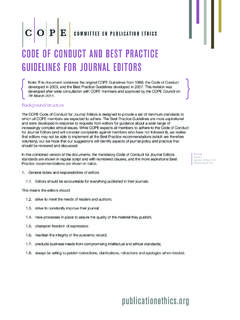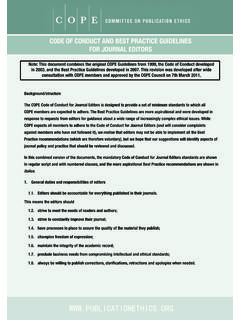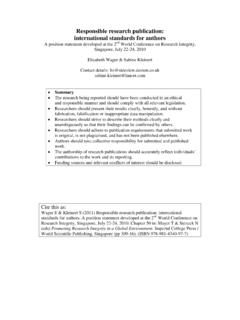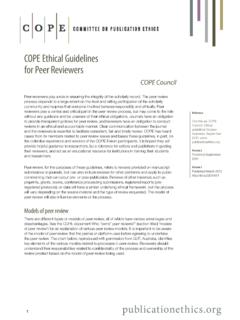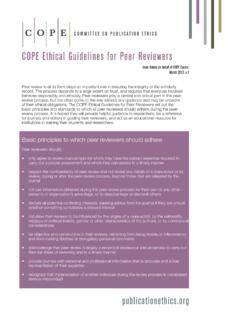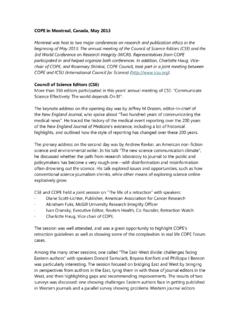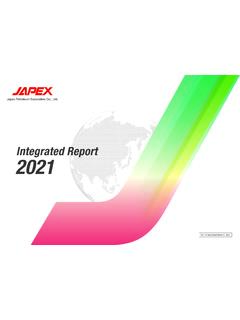Transcription of How to handle authorship disputes:a guide for new …
1 The COPE Report 200332 One of the main tasks of COPE s educationcommittee is to reduce unethical behaviour. Thisinvolves the rather bold step of defining when peoplehave been behaving unethically, and then providingsuggestions on how they can avoid doing so in thefuture. To this end we have written, and tested on agroup of authors, a guide for young researchers on thearea of authorship , which many people agree is one ofthe more confused areas. But writing a document isone thing; disseminating it is another. We wouldtherefore welcome comments, particularly on how wecan use this report to change behaviour, so that itbecomes not just another discussion document, but areal catalyst for theory, authorship sounds straightforward, but inpractice it often causes headaches.
2 While preparingthese guidelines, we heard about several cases. In one, adeserving junior researcher was omitted from theauthor list; in another a sponsoring company insistedon the inclusion of an opinion leader who had madevirtually no contribution to a study. And the writer ofa review article found her name replaced with that ofher boss, because she was on maternity leave when thefinal version was the authors tells readers who did the workand should ensure that the right people get the credit,and take responsibility, for the research. Althoughjournal editors do not always agree among themselveson what constitutes authorship , many of themsubscribe to the guidance from the InternationalCommittee of Medical Journal Editors (ICMJE), alsoknown as the Vancouver latest version, issued in 2001, states that: authorship credit should be based only on:(1) substantial contributions to conception anddesign, or acquisition of data, or analysis andinterpretation of data;(2) drafting the article or revising it critically forimportant intellectual content.
3 And (3) final approval of the version to be (1), (2), and (3) must all be of funding, the collection of data, orgeneral supervision of the research group, bythemselves, do not justify authorship . The problem, as studies have shown, is that whateditors want is not what authors is hardlysurprising given the enormous pressure on individualsand institutions to publish or perish. Thus theprinciples laid down by editors are often breached andby-lines often do not reflect who really did the people (both editors and investigators) feel thatthis misrepresentation is a form of research mis-conduct, and that honesty in reporting science shouldextend to authorship .
4 They argue that, if scientists aredishonest about their relationship to their work, thisundermines confidence in the reporting of the have written this document to help newresearchers prevent and resolve authorship problems. Inparticular it provides: suggestions for good authorship practice thatshould reduce the incidence of such dilemmas, advice on what to do when authorship problemsdo arise, and a glossary of key concepts in authorship , withsome reading lists and websites for those whowish to take this to reduce the incidence ofauthorship problemsPeople generally lie about authorship in two ways: by putting down names of people who took littleor no part in the research (gift authorship , seebelow) by leaving out names of people who did take part(ghost authorship , see below).
5 Preventing a problem is often better than solving itand we recommend the following three principles.(a) Encourage a culture of ethical authorship One problem is that people who are being unethicalabout authorship are simply following local customsand need to be made aware of the viewsof editors, so that in time the culture will change. As ajunior researcher you can make sure your departmentallibrary has at least one book on publication ethics (seelist below).You can also inquire if there is a universityor departmental policy on authorship , and suggest thatyou start working on one if there is not.(b) Start discussing authorship when you planyour researchRaise the subject right at the start.
6 Start gatheringviews of all team members and if possible discussauthorship at a face-to-face meeting. Even before astudy is finished, you should have some idea of thepublications that might come out of it, such as aconference abstract, the full paper, then somesupplementary papers, and who is likely to be mostinvolved in these. Continue to discuss ideas aboutauthorship as the project evolves, and especially if newpeople get involved. Keep a written record of to handle authorship disputes : a guide for new researchersTim Albert, trainer in medical writing,Elizabeth Wager, freelance writer and trainer31858_NEW_pp32_34 13/02/2004 1:07 pm Page 32 How to handle authorship disputes : a guide for new researchers33(c) Decide authorship before you start each articleMany authorship difficulties arise because of misplacedexpectations and poor communication.
7 So it isimportant that, before you start to write up yourproject, you confirm in writing who will be doingwhat and by when. Ideally you should do this face toface, though this may not always be possible. Keepeveryone informed of any changes with a written to handle authorship disputeswhen they occurThe above suggestion, that every team should have awritten authorship agreement before the article iswritten, should reduce the chances of disputes arising at alate stage, when effectively all the real work has accept, however, that many people are reluctantto be pinned down in this way, and that it will not alwaysbe possible to take such a sensible approach in real about authorship can be classified intotwo types: those that do not contravene ICMJE guidelines ( disputes ) and those that do (misconduct).
8 (a) disputes These are largely questions of interpretation, such aswhether someone s contribution was substantial or such cases you need to negotiate with the peopleinvolved. If the suggestions to include or omit namescame from your supervisor, make clear that you are notdisputing his or her right to make such a decision, butshow dispassionately why you do not agree with thedecision. Support this with evidence, such as laboratorynotebooks, manuscripts, ICMJE statement, Instructions toAuthors etc. If you remain unhappy with yoursupervisor s decision, you may consider an appeal tosomeone more senior, such as the departmental head ordean.
9 But you should do this in exceptionalcircumstances only - and make sure your supervisorknows what you are intending to do.(b) MisconductIf you believe that someone is proposing to do somethingwith the authorship list that is unethical, then you have areal problem. Should you say nothing (and therefore becomplicit in the unethical behaviour), or should you blowthe whistle, even though this might damage your careerprospects or future funding? We recommend a third way,which is to explain the fact that the suggested author listcontravenes editors recommendations, and could beconsidered scientific misconduct.
10 Again, stick to the factsand avoid being emotional. Point out that an editor couldwell decline to publish if he or she finds out. As soon asthe meeting is finished, make a note and file you can do if authorship issuesare not resolvedAuthorship may be used as a bargaining tool if teammembers cannot agree on the presentation orinterpretation of results. All authors should see the finalversion of a publication before it is submitted so you canwithdraw your name . This will not be an easy decision,and you must weigh up the loss of credit for the workyou did with the disadvantages of being included insomething with which you do not fully your name is included on a publication against yourwishes you should inform the other authors as soon aspossible.

